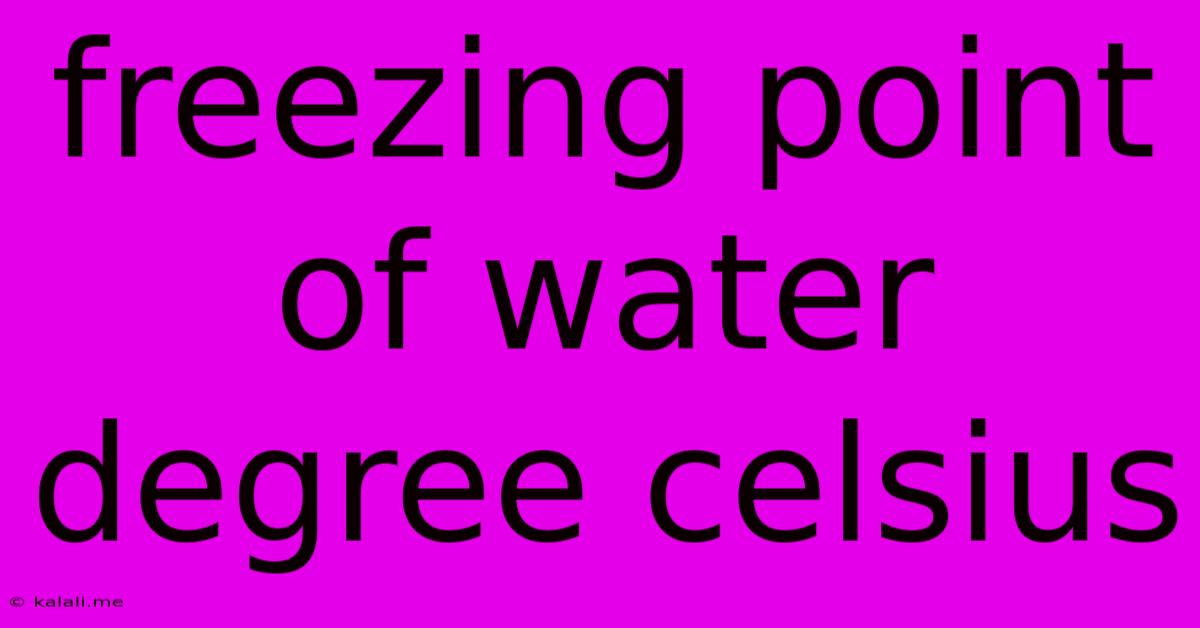Freezing Point Of Water Degree Celsius
Kalali
Jun 02, 2025 · 3 min read

Table of Contents
The Freezing Point of Water: 0° Celsius and Beyond
Water, the elixir of life, exhibits a fascinating property: its freezing point. This seemingly simple fact, that water freezes at 0° Celsius (32° Fahrenheit), is actually a complex phenomenon with implications across numerous scientific fields and everyday life. This article delves into the freezing point of water, exploring its definition, influencing factors, and practical applications.
What is the freezing point of water? The freezing point of water is the temperature at which liquid water transitions into solid ice. Under standard atmospheric pressure (1 atmosphere or 101.325 kPa), this transition occurs precisely at 0° Celsius, or 273.15 Kelvin. This temperature is a fundamental benchmark in many scientific measurements and calculations.
Factors Affecting the Freezing Point
While 0°C is the standard freezing point, several factors can influence this temperature:
- Pressure: Increasing pressure slightly lowers the freezing point of water. This is an unusual property, contrasting with most substances where increased pressure raises the freezing point. This anomalous behavior stems from the unique structure of ice, which is less dense than liquid water.
- Impurities: The presence of dissolved substances, such as salts or sugars, in water lowers its freezing point. This is why we use salt to de-ice roads in winter – the salt dissolves in the water, lowering its freezing point and preventing ice formation at temperatures slightly above 0°C. This phenomenon is called freezing point depression.
- Supercooling: Under specific conditions, water can remain in a liquid state even below 0°C. This is called supercooling and requires the absence of nucleation sites – tiny particles or irregularities that ice crystals can form around. Supercooled water is metastable and will quickly freeze upon disturbance or the introduction of a nucleation site.
The Importance of the Freezing Point of Water
The freezing point of water has profound significance in various aspects of our lives and the natural world:
- Climate and Weather: The freezing point of water is critical in understanding weather patterns, including the formation of ice, snow, and frost. It dictates the transition between liquid and solid water in various climates and influences the hydrological cycle.
- Biology and Ecology: The freezing point of water significantly impacts biological processes. Organisms adapted to cold environments have developed mechanisms to prevent freezing or tolerate ice formation within their cells.
- Industry and Technology: The freezing point of water is crucial in numerous industrial processes, including food preservation, water purification, and cryogenics.
Beyond the Basics: Understanding Phase Transitions
The freezing point of water is a specific point within a broader concept of phase transitions. Water can exist in three main phases: solid (ice), liquid (water), and gas (water vapor). The transitions between these phases depend on temperature and pressure. Understanding these transitions is crucial in fields like thermodynamics and material science.
In conclusion, the seemingly simple freezing point of water at 0° Celsius is a fundamental concept with far-reaching consequences. From understanding weather patterns to preserving food, the properties of water at its freezing point and below profoundly impact our world. This understanding highlights the importance of continually exploring the intricacies of this vital substance.
Latest Posts
Latest Posts
-
Are Hosts Involved In Multicast Routing
Jun 04, 2025
-
How To Add Mod To Relms
Jun 04, 2025
-
Put An Instant Or Sorcery In Your Graveyard
Jun 04, 2025
-
How To Find An Ac Leak On A Car
Jun 04, 2025
-
How Often To Put Bleach In Ac Drain
Jun 04, 2025
Related Post
Thank you for visiting our website which covers about Freezing Point Of Water Degree Celsius . We hope the information provided has been useful to you. Feel free to contact us if you have any questions or need further assistance. See you next time and don't miss to bookmark.